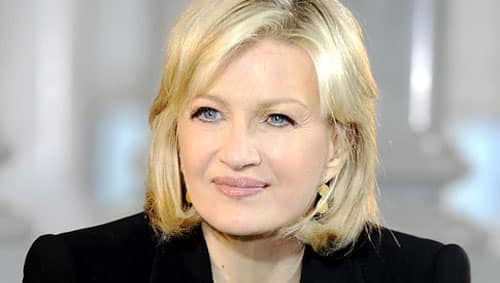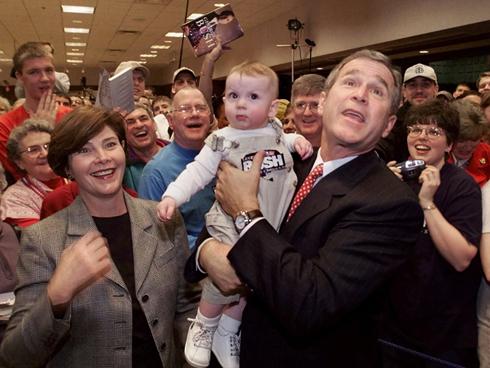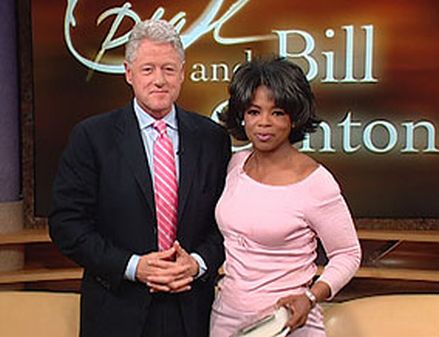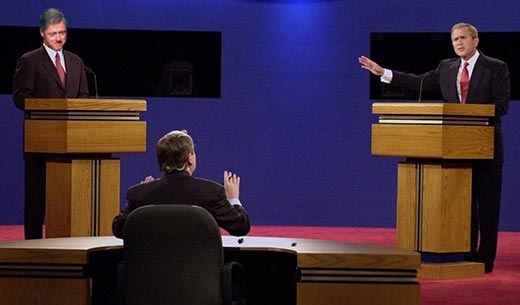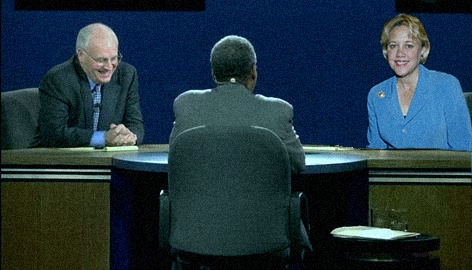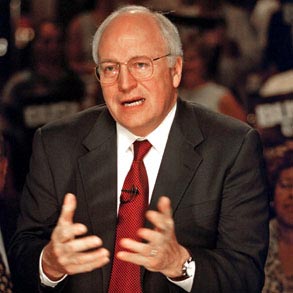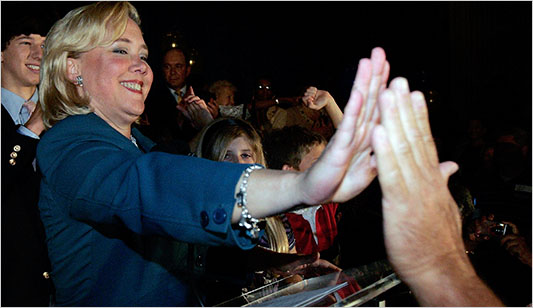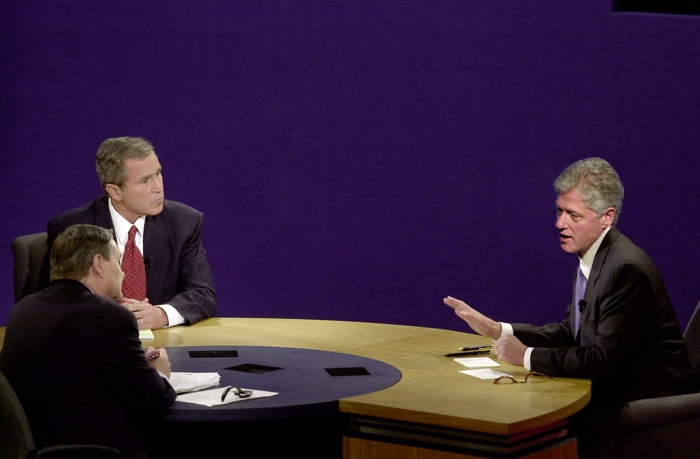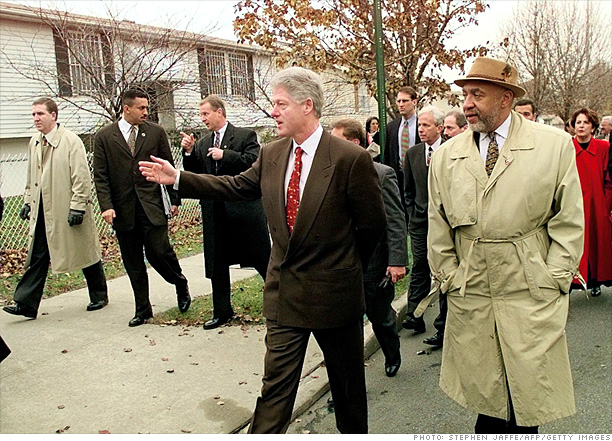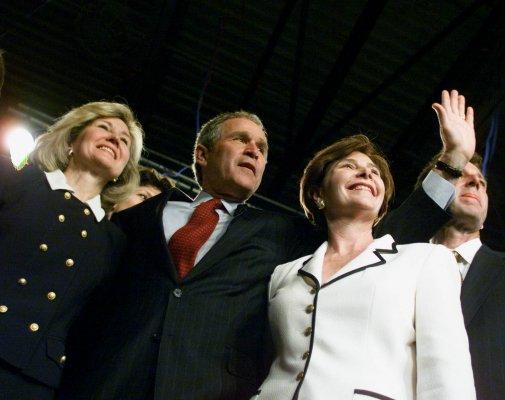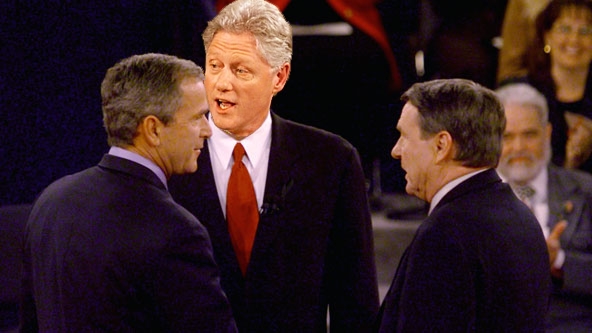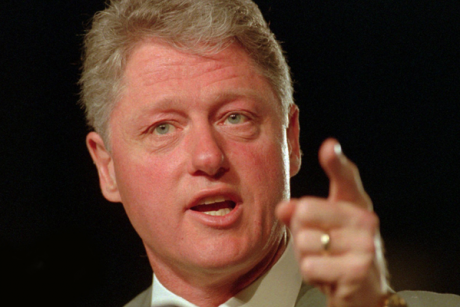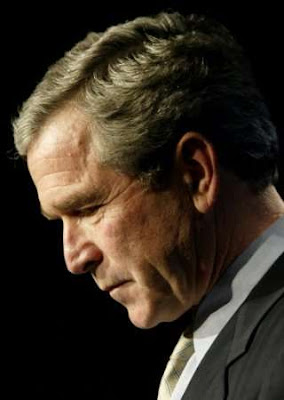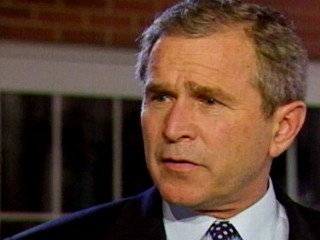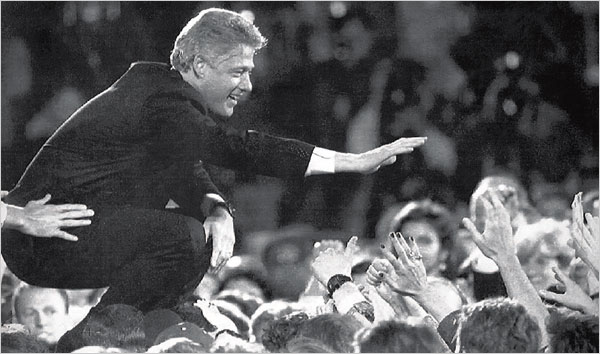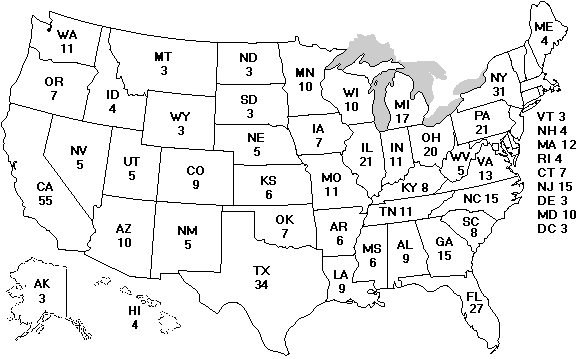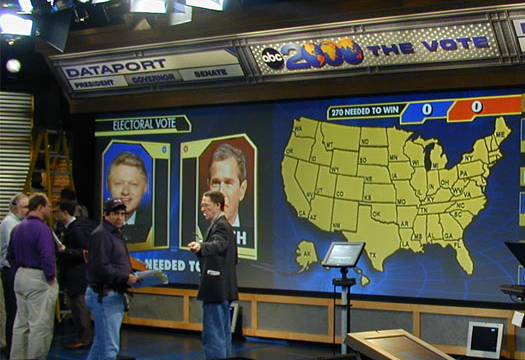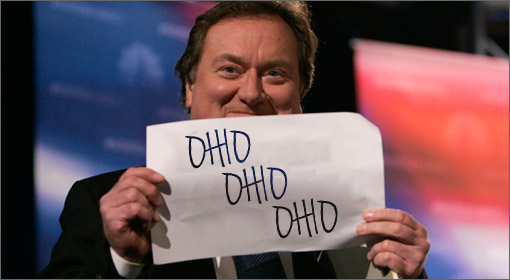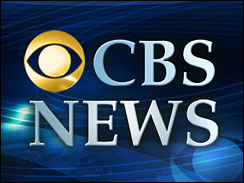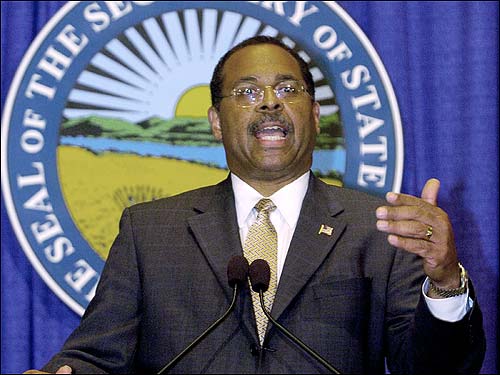Election day was chaotic around the Clinton-Landrieu headquarters. The entire staff was either poring over exit polling data, on the phones coordinating get out the vote efforts or trying to get prominent Democrats on the radio and television urging people to vote for the President.
I really don't think anyone anticipated just how hectic things would be in the offices that day. We knew the election was close, so every extra call, every action could ultimately decide who won the race later that night.
Of course, attention was also given to voter fraud and voter irregularities throughout the country. Around noon eastern time, reports started flooding in from the local Florida Democratic offices that the elderly Palm Beach County voters were confused about their ballots - some insisting they accidentally voted for Pat Buchanan instead of the President.
At first, you don't take stuff like that too seriously. There will always be reports of problems in every voting precinct in America. Generally, it's not too big of a problem and rarely has an impact on the overall race. But this was different. We were receiving hundreds of calls from a specific area within only an hour or so. Something was brewing in Florida and it was not going to help our campaign. But there wasn't much you could do until all the chips fell and we knew where we stood. But I remember standing in the campaign office after hearing about these voter problems and telling Michael Whouley that I hoped the election didn't come down to Florida, or we'd lose. He didn't respond, which I took to mean he agreed. - A 21st Century Campaign (John Sasso)
7:00 EST:
Peter Jennings: Good evening everybody and welcome to our election coverage 2000 - ABC 2000. We're back in Times Square where we were for the great worldwide Millennium celebrations. It likes to think of itself as the Crossroads of the World, but the crossroads of the world are everywhere in the country today. All over the country today, millions of people, perhaps well more than a 100 million are out voting today at every level of government in the country - for the president, for the senate, for governor, for the House of Representatives, for any number of direct action referendum and initiatives around the country. And with an enormous team of people all over the country tonight, we're going to try to make it fun, exciting - it is inherently exciting already. And we'll try to make it instructive as well. As I said, people all over the country - this being billed as the polls close before the election as the closest election in a generation and we're going to see in the course of this evening whether in fact it already, or will, live up to its billing.
Now the polls closed about an hour ago in two states, Indiana and Kentucky, but at this hour, both are too close to call. We can not call either state at this time. And now the polls have closed in six more states and we may now have some projections to make based on the information we have at this point.
In the all important state of Florida, it's too close to call. ABC can't make a projection at this hour. Both campaigns have fought hard over this state's 25 electoral votes and at this hour, 7:00 on the east coast, we're not ready to make a call just yet. That is obviously not a surprise to anyone who has been following this state, as the polls indicated it would be close throughout.
In the state of New Hampshire, it is too close to call. In the state of Georgia, it is also too close to call. That's 13 electoral votes that went to the President in 1992, but swung back into the Republican column four years ago. Republicans feel they will win it again this year, but obviously, things are too close to call at the moment in Georgia.
Virginia, which has been a Republican stronghold, at this hour, it's simply too close to call. Bill Clinton couldn't carry this state in either '92 or '96, so many Republicans do believe that the state will continue to remain Republican, but, at this moment, ABC News is not ready to make a projection.
In the state of South Carolina, ABC News can finally make its first projection of the night. George W. Bush has been declared the winner. This is a state the Republicans have done very well in as of late and it remains that way. Clinton couldn't win it in his past two elections and Bob Dole, four years ago, was able to carry the state by a fairly comfortable margin. So Bush gets the first electoral votes of the night - South Carolina's eight.
Obviously South Carolina has been good to Bush. It was what got his primary campaign back on track after a tough loss in New Hampshire and it helps him in the general - delivering him his first victory of the night.
Not to be outdone, President Clinton has picked up Vermont's 3 electoral votes. He's now won this state in all three of his presidential elections. Vermont a state that had been traditionally Republican until Clinton's win in 1992 and it has solidified as a Democratic stronghold, as he now carries this state, his first win of the night.
And we do now have another projection to make. ABC News can project that George Bush will win the state of Indiana. This is a state the Republicans typically win and so, no surprise tonight. Bush picks up Indiana's 12 electoral votes.
So, here's the map as of 7:10 in New York. President Clinton has 3 electoral votes. George W. Bush 20. It's early. It's close. No surprises just yet, so it's important that you don't read too much into that overall total.
I'm joined now by someone who is very familiar with campaigning, specifically for President Clinton, as he was the communications director for Clinton's campaign in 1992. He oversaw, or helped oversee, their electoral landslide victory over another Bush, George W. Bush's father - uh, George, how does this race compare to '92 at this point?
George Stephanopoulos: We had a pretty good sense early that the President was going to do very well. A lot of traditionally Republican states had not been called by the time 7:00 rolled around and the electoral map was increasingly in the President's favor, even very early. I think, from what I remember, the President was well ahead of President Bush by the time he hit double-figures in the electoral college. Obviously, this is the exact opposite for, uh, the uh Clinton campaign because now they're behind, not considerably, but they're behind, and that's something they didn't see in 1996 and 1992. It's foreign to them. This election is rewriting, if you will, the electoral college because for two consecutive elections, the President really wasn't contested at this level. He saw success in the south, he saw success in the north east, and the west. Now, though, the race is tight and the advantages he had the last go around just aren't there.
Peter Jennings: It'll be interesting to see how this race plays out. Certainly it's looking every bit as close as everyone anticipated. So, as we take a break once more, uh, here's the map now at roughly 20 minutes since polls closed in many of these, uh, unannounced states.
7:30 EST:
Peter Jennings: We have a projection to make. ABC News can now project that Governor George Bush will carry both the states of Kentucky and Virginia. Kentucky is the first state to flip in this election, as it went for Clinton in 1992 and 1996, but it returns back to the Republican category as we can now project, claim, if you will, that Governor Bush will be victorious in that state. Polls had showed him leading, so it's not much of a surprise, as is the same with Virginia. No one really expected the President to win the state of, uh, Virginia.
That means, as of this hour, President Clinton has 3 electoral votes and Governor Bush has 40. So, as you can see, he's jumped out to a fairly decent lead - but, we remind you, it's still very, very early and a lot is expected to happen between now and the time polls close on the west coast.
Peter Jennings: George, what's the story so far tonight?
George Stephanopoulos: Well Peter, I think the story here is that President Clinton isn't doing nearly as well in the south has he did in his past two elections. That's not a surprise, as polls suggested as much, but the map is kind of adjusting to a mix of pre-1992 and post-1988 for the Democrats and Republicans. Which means inevitably, we are going to have an extremely close election.
Peter Jennings: All right, thank you George. Buckle up, it could be a long night.
Uh polls have closed in Ohio, North Carolina and West Virginia and all three are too close to call at this hour. Two of those states, Ohio and West Virginia, the President won in both his elections. Ohio was expected to be very contested. Polls there showed it almost a perfect tie between the two candidates. West Virginia, which Democrats have carried in three of the last four elections, has leaned Republican for almost this entire race. Expectations, though we don't project anything on expectations, suggest Governor Bush will win - but we want, obviously, to wait until the votes come in before making a decision.
I do have a projection to make now. ABC News is ready to call the state of Georgia for George W. Bush. Not a surprise there, as that state, polls indicated anyway, would go to Bush. It does. Bush picks up its 13 electoral votes. As we go to break, here's the map and you can see now Bush leads with 54 electoral votes to President Clinton's 3.
8:00 EST:
Peter Jennings: It is now 8:00 on the east coast and this is the biggie hour as polls have closed in 17 states and the District of Columbia. ABC is ready to make some projections and we begin with the President. President Clinton has the won the state of Connecticut. That's the birthplace of George W. Bush, but that's not good enough to deliver the state to the Republican, as Clinton is now declared the winner of its 8 electoral votes. President Clinton has also picked up the state of Delaware. No surprise there. D.C., Democratic stronghold, remains Democratic stronghold. Clinton wins its 3 electoral votes. Illinois will go Clinton. Maryland, Massachusetts, Michigan, and New Jersey will also go for the President.
Governor Bush has carried his home state of Texas. No surprise there. He's also the winner in Kansas, Mississippi, and Oklahoma. Alabama, Maine, Missouri, Pennsylvania, and Tennessee at this hour are too close to call.
So, that leaves us with Governor Bush at 107 electoral votes and President Clinton at 91. Of course, all eyes are on Florida, Ohio and Pennsylvania, which all remain undecided at this hour.
8:30 EST:
Peter Jennings: The polls in the state of Arkansas, home to Bill Clinton, have closed and the state at this moment - too close to call. ABC can't make a projection in that state as of yet, though the Clinton campaign obviously expecting to carry its own state.
We do have a couple projections to make, though. In the must-win state of Pennsylvania, ABC News is projecting that President Clinton will carry its 23 electoral votes. That's a state the campaign counted on and it's been delivered. Clinton wins Pennsylvania. We can also project that Clinton will win the state of Maine. It's a state the campaign expected to win and they've won it. Maine goes Clinton.
In Alabama, George W. Bush has been declared the winner. Alabama is a traditionally Republican state and that will remain for another election. Bush the winner in Alabama.
We're coming to the 9:00 hour where a number of other states will be called, but first, let's get a look at this race nationally, as ABC News' Lynn Sherr has been tracking the exit polls across the country to get a better idea of the makeup of this year's race.
Lynn?
Lynn Sherr: Thank you, Peter. Anticipation for this race has been pretty high throughout the country, but the voter trends suggest that while turnout is up from four years ago, it's not the record number many expected, or anticipated, with the race being so close. Of course, the biggest question, and something the Clinton campaign has kept its eye on throughout this race, are women voting in higher numbers than men? Did the nomination of Mary Landrieu bring out the female vote, something the campaign had really counted on to deliver them victories in some very contested states?
Well, according to exit polls, Bush won the male vote. That wasn't a surprise, as many predicted that would be the case. The focus, of course, was the margins here and Bush won the male vote with about 51%, so he barely covers a majority of the male vote. The President won about 45% of the male vote, which is probably good news for the Clinton campaign because that's exactly what they wanted. They wanted to keep the margins there respectable, and within single digits, to allow them to swamp Governor Bush with the female vote. So, did they do it?
Well the President carried 53% of the women in our exit polls. That's what they were counting on and it's about the level they saw four years ago. Certainly the Landrieu selection helped solidify those numbers a bit. George Bush carried only 42% of the female vote, so, the gender gap is certainly large. Will it be enough, though? It all depends on which group voted the most.
9:00 EST:
Peter Jennings: It's 9:00 here on what is turning out to be a very close election night and we do have some more results to report. ABC News can now project that the state of North Carolina will go to George W. Bush. I think both campaigns anticipated as much, but it's now official. Bush will carry North Carolina's 14 electoral votes.
Of course, polls have closed in a slew of states and we do have some other projections as well to make. Governor Bush has won the states of Nebraska, North Dakota, South Dakota and the home of his running mate, Dick Cheney, the state of Wyoming. Not a lot of electoral votes there, but obviously every bit helps.
We can also project that President Clinton will win the states of New York and Rhode Island, so, no surprises there as those states typically do go Democratic.
In the states of Arizona, Colorado, Louisiana, which is the home state of Mary Landrieu, Minnesota, New Mexico, and Wisconsin, the polls indicate it's still too early to call.
Let's take a look at the map now and see where we stand.
As you can see, the President now has a lead in the electoral college. It's a narrow lead, but it's his first of the night. Clinton now has 158 electoral votes to Governor Bush's 144.
9:17 EST:
Peter Jennings: ABC News can now project that George Bush will carry the state of Tennessee. This was home to Vice President Al Gore, but the Bush campaign felt they could carry it now that he's not on the ticket and they were right. Bush will win the state's 11 electoral votes.
That gets Bush within three electoral votes of Clinton. You can not get closer in this race than what we have right now. Remarkable.
9:30 EST:
Peter Jennings: We have a major projection to make. ABC News is ready to project the state of Florida for Governor George W. Bush. This is a must-win for the campaign. They needed to win it. They've won it. Now they can celebrate in Austin, as the Bush campaign has carried the very important state of Florida and its 25 electoral votes. ABC News projecting, again, the state of Florida for Governor George Bush. A huge victory that really makes this race winnable for the campaign. Everyone agreed pretty much that without the Sunshine State, Bush just couldn't get it done.
We also can project that President Clinton will win the state of Minnesota. But the story at this hour: George Bush has won Florida.
Let's go to the map and look at the electoral college as it is now with those two states being called:
Peter Jennings: Terry Moran is following the Clinton campaign and he's outside the White House, he's been in communication with the campaign all night - Terry, what is the mood like now that Florida has gone Bush?
Terry Moran: Well the campaign started feeling Florida was lost based on exit polls that were released earlier in the evening, so I'm sure it comes as no surprise to them. It's a disappointment, they did put a lot of effort into the state, but they also know that the election isn't won or lost there. They believe they have other paths to victory, especially in states like Ohio and even the President's home state of Arkansas. But obviously, they wanted a victory here because it would have made a Bush victory very unlikely, but it never materialized, so, for the campaign, it's on to option number two.
10:00 EST:
Peter Jennings: It is now 10:00 and polls have just closed in the remainder of the Midwest states and the Rocky Mountain region, so we do have some projections to make. Governor Bush has won the states of Idaho and Utah. No surprises there. In the states of Montana, Nevada, Iowa, and Oregon, it's too close, and too early, to call those states.
So, that gives Governor Bush 189 electoral votes and President Clinton remains at 168. Neither anywhere, really, near the 270 needed to claim victory, though obviously Bush is closer than Clinton at this hour.
Which means, we continue to wait on overall results.
Let's take a look now at the states we haven't called.
In Ohio, with 75% of the vote in, there you can see President Clinton trails Governor Bush by roughly 15,000 votes. That's how close it is in Ohio. That's the reason why that state hasn't been called, even though its polls closed toward the beginning of the night. In New Hampshire, the margin is less than 7,500 votes. President Clinton trails Governor Bush there. In Missouri, a state that has proven to be a bellweather, Bush leads by about 75,000 votes. So, his lead there is solid, but still with 20% left of the state uncounted, we're not ready to make a projection. In Arkansas, President Clinton holds a lead of about 60,000 votes. So, the President looking to win his state and so far, he's out ahead of Bush there. In West Virginia, Bush is up by about 30,000 votes there. Finally, in Louisiana, home to Mary Landrieu, Bush does lead by about three percentage points, so, while the race is still tight, the Governor does lead there.
That's where we stand at this hour. We knew this race would be close and that's exactly what we're getting. But so far, no real surprises. Which, for both camps, is both good and bad news.
Back with us is George Stephanopoulos to talk to us about Ohio. George?
George Stephanopoulos: Well, Peter, in the exit polls, the economy was the number one issue. And what's interesting is that while most voters, a solid majority, give President Clinton credit for the economy, not all are voting for him. Those who didn't vote for Clinton and instead voted for Bush did so because of social issues - abortion and gun rights being the two most decisive. So, while the President does remain fairly popular in Ohio, like nationally, it's not necessarily translating into votes. He's definitely not performing as well here as he did in '96.
Peter Jennings: Thank you, George. We have a projection to make. Governor Bush has won the state of New Hampshire. ABC can now call that state hours after its polls closed. So, good news for the Bush campaign as they win New Hampshire's four electoral votes. It doesn't sound like much, but in this close of a race, it's significant.
10:20 EST:
Peter Jennings: ABC is now ready to project that Bill Clinton will carry the state of New Mexico. An important state, one the campaign really worked hard to carry, as they did in '96, and they will in this election. So, that brings the President's electoral vote total to 173, while George Bush's total is at 193.
The race remains very close.
11:00 EST:
Peter Jennings: Polls have now closed on the west coast and ABC is ready to project that Bill Clinton will carry the states of California and Hawaii. California, of course, the big electoral prize and a huge victory for the Clinton campaign. Hawaii is no surprise, as well. The state of Washington joins its neighbor Oregon as too close to call at this hour.
So, with those wins, Clinton has now taken the lead and has 231 electoral votes to Bush's 193. Still, neither at the level needed for the presidency, which is 270.
11:10 EST:
Peter Jennings: Missouri has gone Bush. The bellweather state is a huge victory for the Bush campaign and they hope it continues to keep its record as voting for the winner at the national level. It's a state Clinton won in both '92 and '96, but he can't carry it in 2000.
11:20 EST:
Peter Jennings: ABC can project that Bill Clinton will win the state of Wisconsin, while Bush carries Colorado and Nevada. These are expected victories, but important nonetheless as we now reach the point where every victory puts both candidates closer and closer to the 270 needed to claim victory tonight. Bush in Colorado and Nevada, Clinton in Wisconsin.
George, if you can, map out the victory for both campaigns.
George Stephanopoulos: For Governor Bush, victory goes through Ohio. For President Clinton, he can still win this by taking Louisiana and his home state - but both campaigns need to thread the needle just right to come out on top. It's going to be close and I think we'll have a better indication of who's winning once Ohio comes in. Until then, though, we can only wait and speculate.
11:50 EST:
Peter Jennings: It's 10 minutes before midnight here on the east coast and we are ready to make a call in Arkansas. The President will carry his home state. ABC is projecting Clinton the winner in Arkansas. It's a big win and an important win for the campaign, even if it turns out to be only symbolic. But it does put them now only 22 electoral votes away from reelection. That means if he wins the state of Ohio, coupled with either Washington or Oregon, where he'd led in the polls, he will win. If he can't win Ohio, he would need to win Washington, Oregon and either Iowa, Louisiana, or West Virginia - on those latter three, the President trails.
So, you can see just how small the margin of error is here for both campaigns. And it very well could come down to Ohio.
12:00 EST:
Peter Jennings: Polls are now closed in Alaska and ABC News projects Governor Bush will win that state. We can also project Governor Bush the winner in Arizona, Montana and West Virginia. Bush becomes only the second Republican to win the state in the last 30 or so years, joining Ronald Reagan in 1984.
We can also project Clinton the winner in Washington and Oregon. Those states typically lean Democratic and they will remain Democratic.
So, let's take a look at the map now to just show you how close this election is.
Peter Jennings: If Clinton can win just one more of the three states we have not called, he will win a third term. That means Governor Bush has to run the table in Iowa, Ohio and Louisiana. The good news right now for the Bush campaign is that they lead in all three. The bad news is that their lead in Ohio is very small and as we've reported earlier tonight, a great deal of the Cleveland area has still not been counted. So, if there is any hope for the President, it's that he could overcome the Bush lead in Ohio with these latest numbers. Right now, he trails by a mere 2,423 votes with about 98% of the state in. That two-percent, which very well could decide this election, is in Cuyahoga County.
It doesn't get much closer than that, folks. Really.
12:20 EST: ABC is ready to call Louisiana for Governor Bush. Mary Landrieu can't deliver her home state, a state Clinton carried twice before tonight. So, Bush now has 244 electoral votes, Clinton 266. That's a difference of only 22 - Ohio has 21. That's the election right there, folks. Bush needs to win both Ohio & Iowa to claim the victory - Clinton just needs one.
But we have to wait because these numbers are close. Very close.
1:00 EST:
Peter Jennings: It is 1:00 now on the east coast and the map remains the same. President Clinton has 266 electoral votes, 4 away from victory, while Governor Bush has 244 - 26 electoral votes away from victory. Iowa, which still has not been called, is about 90% counted and Bush does a hold lead there. He needs to win that state in order to survive. In Ohio, 99% of the vote is in and Bill Clinton holds a narrow 3,421 vote lead. If these numbers hold, if they stand, it's entirely possible, the margin being less than .25%, that an automatic recount will happen. We are actually being told that the Ohio Secretary of State, Ken Blackwell, is going to meet with reporters at roughly 1:30 EST. So, we wait for that. But you can see the total, with 99% of the vote, Clinton's lead is now 5,313 votes - but still remarkably close as this is out of almost five million votes. That's how tight this race is there in Ohio.
1:25 EST:
Peter Jennings: There you, uh, see a press conference that is set up for Ohio Secretary of State Ken Blackwell. He's, uh, expected to speak with the media at any moment on the ongoing vote total in Ohio. We have not projected Ohio because the total is extremely close, but we can tell you this, with nearly 100% of the vote in, President Clinton holds a lead of about 10,000 votes. That's narrow. We don't know if it's, uh, narrow enough to trigger an automatic recount, but we do know that the results are very, very, very close. And I see, uh, I see that Ken Blackwell is now coming up to the podium, so, let's, uh, let's go to Ohio.
Ken Blackwell: Good morning everyone. I decided to call this press conference because of the very narrow margin we have here in Ohio with the presidential election. I can report that all precincts have reported and we're pretty much at 100%. With the important nature of this election, it's our intent to get it right. We don't want a situation to arise where the American people aren't sure who their president will be. I can say that, going over the raw totals, President Bill Clinton leads Governor George W. Bush with 2,322,502 votes to 2,310,498 votes. That is an overall difference of just 12,004. That's out of 4,801,058 votes cast. President Clinton has a share of 48.37% of the vote. Governor Bush has a share of 48.12%. Because the margin does not exceed .25% of the vote, there will be an automatic recount. So, at this point, it's the decision of the office of the Secretary of State to not declare a winner in the State of Ohio until a recount has taken place.
Understanding the pressure we are working under here and the knowledge that the election may rest in the hands of the voters here in Ohio, we want a timely, and efficient overall vote tally. We anticipate the recount will begin around 8:00 this morning and it shouldn't take but a few hours to get those final results in and hopefully the decision as to who our president will be. I hope you understand that I can't take any questions at this time, though, I will hold another press conference later in the morning when the official tally has been completed.
Thank you.
Peter Jennings: While Ken Blackwell was speaking, we did have a call to make, which is significant and really underscores what Mr. Blackwell was saying. George Bush has won Iowa. This keeps his hopes of the presidency alive. Because of this, it all comes down to Ohio and you heard the numbers there. Clinton holds a lead of 12,004. Which means, ultimately, at about 1:45 here in the morning, we don't have a winner. And we might not have a winner until later today. Certainly this is not unusual, as past elections have gone well into the morning hours. But we have no further news to report. The counting is unofficially done in Ohio and that's where this election lies. So we wait. This is the map as of this morning. President Clinton has 266 electoral votes, Governor Bush has 251 electoral votes. It all comes down to the state of Ohio.
TOO CLOSE TO CALL!
Election hinges on Ohio recount - Clinton narrowly leads by 12,000 votes





